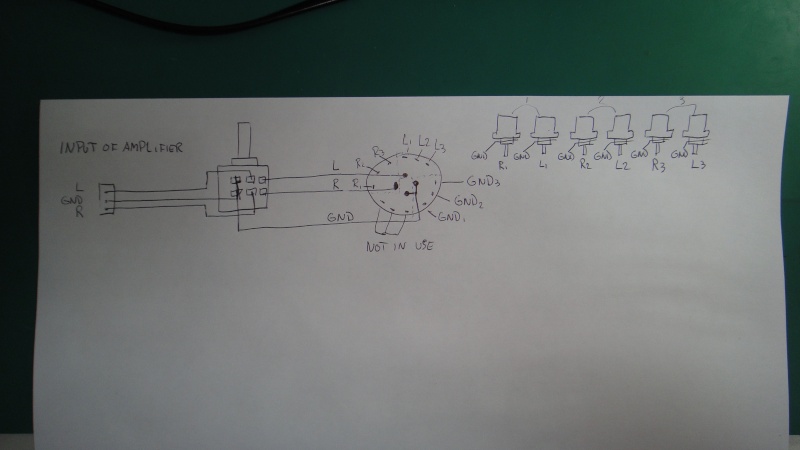I've just noticed my Arjen Helder TA2020 has sound leaking through the input selector.
If I play audio on a channel, switch to a different channel and turn the level up I get the audio of the playing channel coming through at low level.
Any idea why or how to fix?
I followed Arjen's build diagram to the letter following this diagram and used twisted cat5 from RCA to selector.

If I play audio on a channel, switch to a different channel and turn the level up I get the audio of the playing channel coming through at low level.
Any idea why or how to fix?
I followed Arjen's build diagram to the letter following this diagram and used twisted cat5 from RCA to selector.

Rubbish switch.
Hi-End Hi-Fi often gets around this by using relays but the bottom line at budget level is that you need to obtain a good quality switch.
Hi-End Hi-Fi often gets around this by using relays but the bottom line at budget level is that you need to obtain a good quality switch.
Last edited:
Runs of cable/ PCB tracks that are parallel to each other are electrically coupled and so inducing a current and voltage into eah other so that is why you hear the music at a low level on other channels.
The use of relays does nto eliminate the problem , it is the shorter signal paths that does not allow the electrical coupling. so the shorter the path the less te induction.
So a better switch will not improve the situaton
IF you build a PASS B1 buffer with relays , if the cables are not very short you get exactly the same problem.
Look up Induction on wikipedia fr more details
The use of relays does nto eliminate the problem , it is the shorter signal paths that does not allow the electrical coupling. so the shorter the path the less te induction.
So a better switch will not improve the situaton
IF you build a PASS B1 buffer with relays , if the cables are not very short you get exactly the same problem.
Look up Induction on wikipedia fr more details
I concur. Your drawing does not show how you have implemented the design in practice.
A photo may help to help you.
A photo may help to help you.
Runs of cable/ PCB tracks that are parallel to each other are electrically coupled and so inducing a current and voltage into eah other so that is why you hear the music at a low level on other channels.
The use of relays does nto eliminate the problem , it is the shorter signal paths that does not allow the electrical coupling. so the shorter the path the less te induction.
So a better switch will not improve the situaton
IF you build a PASS B1 buffer with relays , if the cables are not very short you get exactly the same problem.
Look up Induction on wikipedia fr more details
Have you seen my posts of my B1?
It is completely FREE of any crosstalk, even though it does have cables that seem to go everywhere.
Parasitic capacitance causes coupling. If there is no signal source on the selected input, the high input impedance accepts the parasitic current from the other channel. The correct solution is shorting unused (or unselected) inputs (maybe after a series resistance, to avoid overload). But this cannot be done with rotary switch. Relay with morse contacts can do the job.
So does having the 3 twisted trios of wire running close to each other from the slector to the RCAs make this problem worse? If I were to route the 3 twisted cables with more distance between eachother would this reduce the problem?
Also with regard to terminating the RCAs that are not in use - would something like the caps that Allen and Heath use on their mixers work?
Also with regard to terminating the RCAs that are not in use - would something like the caps that Allen and Heath use on their mixers work?
So does having the 3 twisted trios of wire running close to each other from the slector to the RCAs make this problem worse? If I were to route the 3 twisted cables with more distance between eachother would this reduce the problem?
Running cables next to each is the worst thing to do for crosstalk.
I often see very neat wiring layouts with cable ties holding many wires close to each other and this is bad practice.
Also wires next to transformers can induce hum.
- Status
- Not open for further replies.
- Home
- Amplifiers
- Class D
- Sound leaking on input selector - why?